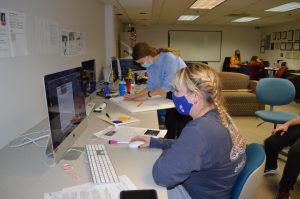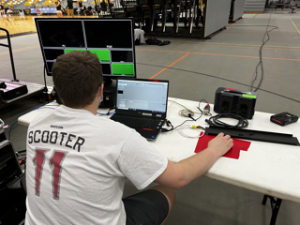Student journalism must not be censored
February 23, 2022
Over the years, the UW Oshkosh Advance-Titan has broken stories about important topics such as plagiarism and misconduct by professors, sexual harrasment cases and theft by students and staff. All of these stories demonstrate the significance and informative capabilities of student journalism.
On the national stage, student journalists reported on important topics such as elections, the pandemic, racial justice and civic engagement over the last two years alone, providing invaluable insight and perspective to the larger, national discourse.
Despite all of its accomplishments and capabilities, student journalism enjoys much less freedom than regular press outlets, and is constantly facing the threat of censorship. Student journalists are real journalists, and deserve protection from the censorship they face from their administrations.
Student Press Freedom Day, celebrated annually on Feb. 24, marks a day to both celebrate the work of student journalists and bring attention to the threats they face. This year’s theme is “Unmute Yourself,” and seeks to inform student journalists about the dangers of censorship. Student journalists must be empowered to tell stories that are important to their communities and be able to withstand the pressures that lead to self-censorship.

The Advance-Titan has been informing UW Oshkosh faculty, students and the community at large since its creation in 1894.
As recently as 2019, the North Star, Oshkosh North High School’s student newspaper, was the victim of administrative censorship when the school took down a factually accurate story regarding the suspension of the assistant principal. On top of this, the school pressed the student to reveal an anonymous source and subsequently established a prior restraint process on the paper, two further blatant violations of the publications First Amendment rights.
While the student ended up winning the case against the school (after widespread opposition to the decision around the state), it shows that there is still fighting to be done to ensure the utmost protection for student journalists, as there will always be people wishing to regulate the flow of information.
Just this month, the Foundation for Individual Rights in Education (FIRE) sued Tarleton State University in Texas for withholding public documents regarding how they censored (and attempted to take independence from) a student newspaper that looked into the “inappropriate behavior” of a former professor.
While issues like this are easy to spot, student journalists also face another, lesser-known form of censorship: self censorship. The Student Press Law Center (SPLC), the founders of Student Freedom Day, defines self censorship as “when student journalists choose not to pursue a story out of fear that their story will not be allowed to be published, or they will experience retaliation from administrators or those who hold a form of power over them.”
Student publications censor themselves when they fear repercussions from administrators such as budget cuts and other indirect forms of censorship. Self-censorship is usually applied regarding the coverage of topics that reflect poorly on the school, as they are likely to receive pushback from the institution who wish to save face.
These kinds of stories, however, are perhaps the most important that a student publication can run, as they fulfill the journalistic promise of informing the public about events and information that would otherwise be hidden. Often times, the most “sensitive” or “controversial” material is some of most important, as it breeds widespread discussion of topics and brings awareness to important societal issues, just as journalism has to in order to fulfill its role in a functional, information-driven democracy.
It is the job of University of Marketing and Communications (UMC) to promote UW Oshkosh and put happenings in a positive light, but it is the job of student media to tell the truth. And on Student Press Freedom Day, there is no better time to remind students, faculty, staff, administrators and the community at large of the important role student media plays.
The Advance-Titan has taken that role seriously, telling a variety of stories in recent years that some university administrators likely wished we didn’t tell.
Some of the stories resulted from Freedom of Information requests, such a professors accused of or found guilty of plagiarism, misconduct and threats, and a former volleyball coach who was fired after an investigation found evidence to support a student’s sexual harassment allegations.
Other stories, however, resulted simply because our reporters were paying attention. For instance, reporters listened to rumors of missing IT equipment and started making inquiries. Later, an UWO IT specialist would be found guilty of stealing between $10,000 and $100,000 of movable property.
Another story about a basketball player who left UW Oshkosh came about when the Advance-Titan’s sports reporter noticed the star player was no longer playing and his picture had disappeared from the athletics website. That player was later charged with two counts of theft for stealing and reselling merchandise from the university bookstore, and he signed a Deferred Adjudication Agreement and pleaded no contest or guilty to both counts of theft.

The student-run Titan TV was created in 1968 to provide news broadcasting, sports coverage and other original programming.
We are thankful that UWO administrators understand the importance of press freedom and have not fought for prior review or overt censorship. UMC sometimes makes it difficult for student reporters to get sources to talk in a timely manner, or just gives reporters a list of responses from our questions. This is because, in order to contact staff members, Advance-Titan reporters (and all media) are required to go through UMC. According to Executive Director of Marketing and Communications Peggy Breister, the size of the university demands that the media relations are coordinated through a team.
Despite this, Advance-Titan Editor-in-Chief Cory Sparks said that the Advance-Titan is able to pursue important stories and report the truth without any fear of censorship.
“At UWO, I feel protected from censorship,” he said. “The Advance-Titan is able to pursue breaking stories on and near campus with conviction and truthful intent via the First Amendment, and I don’t feel that the university infringes upon that right.”
Sparks also said that student journalism fulfills an essential role in preparing students for their future lives.
“Student journalism is the bridge that all collegiate student bodies need,” he said. “Without this exposure from a publishing and consuming standpoint, many will be “thrown into the fire” once they leave college and live their everyday lives.”
UW Oshkosh’s students who comprise WRST Radio and Titan TV also take that role seriously.
Titan TV Sports Director Eric Krueger said that freedom from censorship is essential to providing fair and informative coverage.
“I believe that every single subject matter is entitled to an equal amount of coverage,” he said. “Censorship in the media takes away the integrity of journalism, and more and more these days we see this occurring.”
Krueger also said that he has always felt enabled to do his job without any interference at UWO.
“I believe that as a student journalist here at UWO, we can cover stories to their extent and not feel any censorship that takes the integrity out of the story or job,” he said.
Overall, however, self-censorship is on the rise, making the efforts of organizations such as the SPLC, the FIRE and, of course, students themselves all the more important. A 2021 study done by the FIRE revealed that 83% of college students feel that they engaged in self-censorship on campus, representing a drastic increase from the 60% who reported the same in the 2020 study.
One of the ways that the SPLC is working to protect the rights of student journalists is through the New Voices movement, a piece of legislation that seeks to protect students from the censorship that has become so common since the ruling of Hazelwood School District v. Kuhlmeier in 1988. The legislation, which is already in effect in 15 states, reverses the standards set by Hazelwood, and gives student journalists the freedom they deserve. Wisconsin, however, is not one of the states that has adopted these protections. Despite having a New Voices campaign in 2016, nothing was ever put into place.
Even so, there are resources that student journalists can utilize in order to protect themselves. Organizations like the SPLC and the FIRE offer student journalists everything from legal hotlines, training seminars, toolkits for reporters and a plethora of guidebooks so that student journalists can know their rights and do their job without fear of unjust consequences.
While Student Press Freedom Day is only celebrated once a year, the lessons it teaches must be remembered every day in order to protect students’ First Amendment rights. Student journalism represents an amazing opportunity for young journalists to form critical thinking and questioning skills while simultaneously providing vital information and perspective to the public, and deserve freedom from censorship when doing this.













